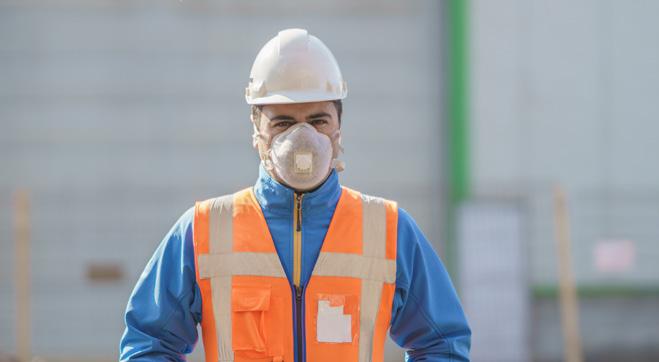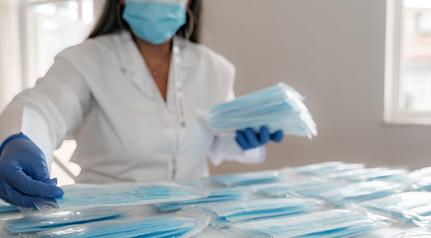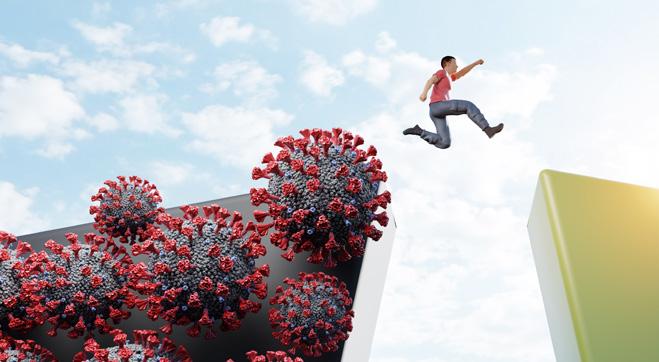
4 minute read
Safeguarding the Safety Equipment Supply Chain
ISEA worked with lawmakers to add respirators to the PREP Act, fight counterfeit products, build a more resilient safety equipment supply chain and more
Healthcare workers and first responders urgently needed personal protective equipment, such as respirators, while on the front lines of the COVID-19 pandemic. ISEA collaborated with the National Institute for Occupational Health and Safety (NIOSH) to bring NIOSH-approved respirators to market, moving swiftly to safeguard people’s health and safety in a time of crisis. But the organization’s work was only beginning.
From educating legislators and the public on PPE fraud and counterfeit products to working with the U.S. government to futureproof the safety equipment supply chain against disruptions, ISEA has been in the trenches of the fight for safe and effective PPE.
SHORING UP THE AT-RISK RESPIRATOR SUPPLY
As the demand for NIOSH-approved N95 respirators exploded in 2020, safety equipment companies faced a distressing dilemma: Ramping up production to meet respirator demand posed legal risks for companies and health risks for their employees. ISEA members went to Congress with a solution: Add NIOSH-approved respirators to the Public Readiness and Emergency Preparedness (PREP) Act. This law would shift the liability of items needed for a public health emergency response to the federal government.
In the House of Representatives, Don Bacon (R-NE), Paul Tonko (D-NY) and Jim Langevin (D-RI) were the first to step forward, co-sponsoring a bill to add respirators to the PREP Act. Senators Kyrsten Sinema (D-AZ) and Deb Fischer (R-NE) offered the companion bill in the Senate. Their action gave then-Senate Majority Leader Mitch McConnell (R-KY) legislative text to add to the CARES Act he was drafting at the time.
Thanks to these six elected officials, Sections 3012 and 3013 of the CARES Act added respirators to the PREP Act. The bill became law on March 27, 2020.

TIMELINE 2020
[CONTINUED]

SERVING AS THE AUTHORITY ON SUPPLY CHAIN CHALLENGES
The U.S. government called upon senior executives at ISEA to serve as experts in the PPE field and the industry’s response to the pandemic.
• July 30, 2020: Former ISEA
President Charles Johnson testified before the Senate Committee on Finance about protecting the reliability of the U.S. medical supply chain during the COVID-19 pandemic. He advocated for the safety and efficacy of the PPE used to combat COVID-19, and explained the need to better prepare for and respond to future health emergencies.
• September 23, 2020: ISEA’s
Senior Director of Policy Dan
Glucksman appeared before the
U.S. International Trade Commission to testify at a public hearing for investigation 332-580: COVID-19
Related Goods: The U.S. Industry,
Market, Trade, and Supply Chain
Challenges. “The key to addressing any future surges in PPE demand comes down to augmenting the
SNS [Strategic National Stockpile] and doing a much better job in anticipating how and where demand will emanate,” Glucksman said. “The goal we all share is to get PPE into the hands of people who need it, when they need it, and ensure that it is safe and effective.”
PREPARING FOR THE FUTURE
When it comes to supplying PPE, the industry’s role is to better position the U.S. for future pandemics and other emergencies. Since 2009, when PPE stocks were depleted due to the flu pandemic, ISEA and its members urged Congress and the Strategic National Stockpile (SNS) to act in ensuring the U.S. is prepared to respond to health safety threats. Throughout the COVID-19 pandemic, ISEA has worked with the U.S. government to help restock the SNS and support a better state of readiness.
ISEA established a close relationship with President Biden’s COVID-19 response team to ensure its members are the authoritative voice in advocating for better quantitative forecasting and management for future emergencies; to establish a more robust and regular partnership with the government and other entities that must prepare increased quantities of these products for future emergencies; and to collaborate on additional policy solutions that forecast demand and better manage supply through stockpiling, production capacity support, and other solutions that price future surge demand into the supply chain.
KEEPING THE MARKET SAFE
Throughout the pandemic, ISEA and its members have strived to keep the market protected. They have strongly condemned price gouging and PPE hoarding, as well as worked with federal agencies and international governments to fight fraud and counterfeit products.
An ISEA ad hoc anticounterfeiting subcommittee was quickly established to respond to immediate issues, including providing examples of scams and counterfeit goods to federal agencies. The committee also educated the public on how to avoid fake PPE products.


MARCH 3 The HHS says the U.S. strategic national stockpile has about 1% of the required respirator masks needed to equip health workers in a full-blown pandemic.
MARCH 11
The WHO declares COVID-19 a pandemic.
MARCH 24
The FDA issues an emergency use authorization (EUA) for imported, non-NIOSHapproved disposable filtering face-piece respirators.
MARCH 27
President Trump signs the CARES Act into law, which grants liability protection for respirators.



